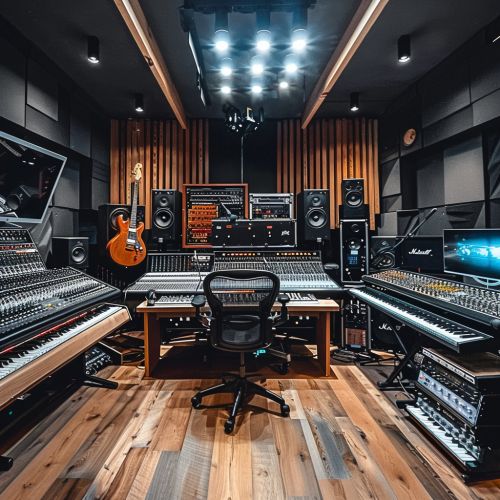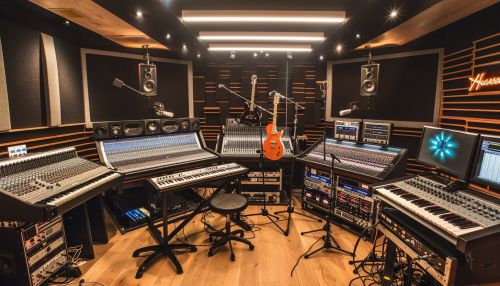Music technology
Introduction
Music technology refers to the use of any device, mechanism, machine or tool by a musician or composer to make or perform music; to compose, notate, play back or record songs or pieces; or to analyze or edit music. The earliest known applications of technology to music was prehistoric peoples' use of a tool to hand-drill holes in bones to make simple flutes. Ancient Egyptians developed stringed instruments, such as harps, lyres and lutes, which required making thin strings and some type of peg system for adjusting the pitch of the strings. Ancient Greeks also developed ophecleides, which were similar to tubas.
History
The development of electric music technology began with the invention of the telegraph in 1837, which was used to create the earliest known electronic musical instrument, the telegraphony, in 1857. The phonograph was invented in 1877, and it used a mechanical method of recording and reproducing sound. In the early 20th century, electric technologies such as the telephone, radio and television had a profound influence on the development of music technology and music production.


Music Production
Music production technology includes the equipment used in a recording studio to create music. This includes microphones for recording vocals and acoustic instruments, digital audio workstations (DAWs) for creating and editing music, and synthesizers for creating electronic sounds. Other important music production technologies include audio mixers, which are used to balance the levels of different audio tracks, and mastering equipment, which is used to finalize a recording.
Electronic and Digital Music
Electronic music technology is a significant aspect of the music industry. It includes the use of electronic musical instruments, digital instruments, and electronic music technology, including music software and hardware. Electronic music technology has had a significant impact on the music industry, as it has enabled the creation of new sounds and has made it possible for musicians to create music without the need for traditional musical instruments.
Music Software
Music software refers to software used for musical composition, digital recording, the creation of electronic music, and other musical applications. Music software includes Digital Audio Workstations (DAWs), software synthesizers, and music notation software. DAWs are used for recording, editing, and producing audio files. Software synthesizers generate synthesized sound, and music notation software allows for the composition of music notation in a graphical interface.
Music and the Internet
The Internet has had a profound impact on music technology, with online platforms for music distribution, such as iTunes and Spotify, becoming prevalent. The Internet has also facilitated the development of software for creating and editing music, and it has provided a platform for the distribution of music software. Additionally, the Internet has facilitated the sharing and distribution of music through websites, social media, and other online platforms.
Future Trends
The future of music technology is likely to be influenced by developments in artificial intelligence, virtual reality, and augmented reality. Artificial intelligence is being used to create music, with algorithms capable of composing music in a variety of styles. Virtual reality and augmented reality are being used to create immersive musical experiences, with virtual reality concerts and augmented reality music apps becoming increasingly popular.
